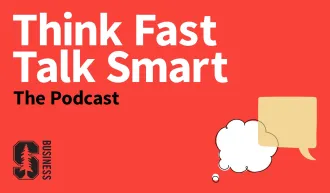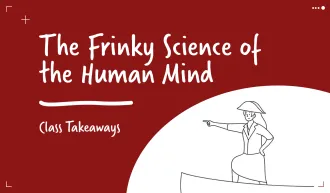Gift List: 10 Books to Share for the Holidays
Stanford GSB professors recommend the books they’re most likely to give as presents over this year’s holiday season.
December 06, 2019

Stanford GSB faculty offer up their favorite books for your holiday reading list. | iStock/Thinglass
For our holiday reading list this year, we asked several Stanford Graduate School of Business professors to pick a book that they would be likely to give to a friend. Their suggestions would make an eclectic gift basket, ranging from classic fantasy to modern comedy to a history of genetic sequencing.
1. Give and Take: Why Helping Others Drives Our Success
Adam Grant, 2013
“Grant lends scientific validation to the theory my children have long championed, particularly in the weeks preceding their birthdays: that giving is not only good, it’s also the key to being successful. Grant unpacks research studies showing that people who are generous and genuinely try to help others are more likely to have higher grades, be more productive, earn more money, be granted more promotions, and ascend to leadership positions. You should not only read this book, you should buy an extra copy and give it to your kids. Ideally, just before your birthday.” — Jennifer Aaker, the General Atlantic Professor
2. Bottle of Lies: The Inside Story of the Generic Drug Boom
Katherine Eban, 2019
“This fascinating and important book dives deeply into the workings of an industry celebrated for delivering affordable medicine. Katherine Eban’s decade-long investigation spans the globe and captures insights from insiders within companies and regulators who work under different legal, institutional, and cultural settings. As the title suggests, countering fraud remains a huge challenge. If we want the medicine we ingest to cure us as its makers claim, becoming aware of the problems and demanding that governments deal with them properly on our behalf is essential.” — Anat R. Admati, the George G.C. Parker Professor of Finance and Economics
3. Your Inner Fish: A Journey Into the 3.5-Billion-Year History of the Human Body
Neil Shubin, 2008
“Your Inner Fish tells the mind-blowing story of the discovery of Tiktaalik, a fish that shows the evolutionary transition between swimming fish and four-legged reptiles, birds, and mammals. Precise, exciting, and informative, this may be the best pop science book I have ever read.” — Mohammad Akbarpour, assistant professor of economics and the Philip F. Maritz Faculty Scholar for 2019–2020
4. Enlightenment Now: The Case for Reason, Science, Humanism, and Progress
Stephen Pinker, 2018
“This book provides a relatively optimistic view of modern society and human progress. Although I didn’t buy into all the arguments, it nonetheless opened my eyes to a different way of viewing the current state of the world. And, at a minimum, it provided a welcome respite from what seems like a constant bombardment of negativity in everything else I read!” — Lisa De Simone, associate professor of accounting and the James and Doris McNamara Faculty Scholar for 2019–2020
5. Dear Committee Members
Julie Schumacher, 2014
“For many years, I have given a copy of the book Lucky Jim, by Kinglsey Amis, to my PhD students. It’s an all-time send-up of academia told from the point of view of a young assistant professor. More recently, I have started handing out copies of Dear Committee Members, which won the Thurber Prize for American Humor in 2015. Her version of academe is side-splittingly funny, and the jokes hit all-too-close to home.” — Francis J. Flynn, the Paul E. Holden Professor of Organizational Behavior
6. The Kites
Romain Gary, 1980
“Gary was a French diplomat, film director, WWII pilot, and a novelist who used various pen names. He also once challenged Clint Eastwood to a dual over the heart of a woman (Eastwood declined). The Kites, which is the last novel he wrote, is an empathetic, humorous, and touching story of love, resistance, and human spirit set in Nazi-occupied Normandy during WWII.” — Yonatan Gur, associate professor of operations, information, and technology
7. Red Notice: A True Story of High Finance, Murder, and One Man’s Fight for Justice
Bill Browder, 2015
“An autobiography by a Stanford GSB alumnus that intertwines finance, Russia, and human rights, reads like a novel, and resonates even more today than it did in 2015, when it was published.” — Charles I. Jones, the STANCO 25 Professor of Economics and the Charles and Melissa Froland Faculty Fellow for 2019–2020
8. Finance and the Good Society
Robert J. Shiller, 2012
“It offers interesting insights on how financial markets can benefit the greater good of society.” — Jinhwan Kim, assistant professor of accounting
9. The Lord of the Rings
J.R.R. Tolkien, 1954
“Tolkien’s world is incredible. My takeaways from the story: Persistence pays. Good stuff wins. Team matters.” — Harikesh Nair, the Jonathan B. Lovelace Professor of Marketing
10. The Gene: An Intimate History
Siddhartha Mukherjee, 2016
“The book describes how our understanding of genes and genetics was formed in chronological order. It is an unlikely yet powerful combination of scientific knowledge and storytelling.” — Seungjin Whang, the Jagdeep and Roshni Singh Professor of Operations, Information & Technology
For media inquiries, visit the Newsroom.
Explore More

Stanford GSB Faculty Share Their Holiday Reading Lists

7 of Our Favorite Podcast Episodes of 2023



